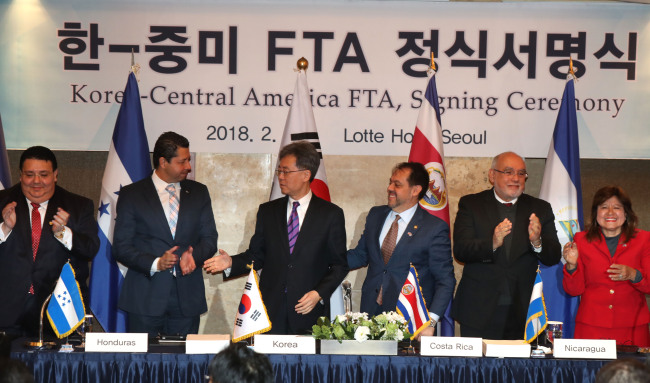Korea signed a free trade agreement with Central America -- Costa Rica, El Salvador, Honduras, Nicaragua and Panama -- on Wednesday, becoming the first Asian nation to do so, with hopes of increasing exports of cars, steels and cosmetics.
“The agreement between Korea and Central America will be an opportunity to build a comprehensive, strategic partnership among the nations,” Trade Minister Kim Hyun-chong said at a signing ceremony attended by trade ministers from the five nations on Wednesday morning in Seoul.
The nations vowed to build plans to maximize outcomes of the trade deal and to make mutual efforts for the deal to take effect quickly.

Trade Minister Kim Hyun-chong (third from left) attends a signing ceremony for free trade deals with Central America with El Salvador’s Economy Minister Tharsis Salomon Lopez Guzman (from left), Honduras’ Minister of Economic Development Arnaldo Castillo, Costa Rica’s Minister of Foreign Trade Alexander Mora, Nicaragua’s Minister of Development, Industry and Commerce Orlando Salvador Solorzano Delgadillo and Panama’s Vice Minister of International Trade for Negotiation of the Ministry of Trade Salazar Diana. (Yonhap)
The Korean government plans to report to the National Assembly to ask for ratification under the trade procedure law with the aim of bringing the agreement into force in the first half of this year.
Under the deal, tariffs of more than 95 percent of all products from the Central American nations will be immediately or gradually eliminated, according to the government.
Korea expects to see growth in exports of its mainstay items, including cars, steels and synthetic resins as well as products from SMEs including cosmetics, medicine and medical supplies, aloe beverages, textiles and car parts.
“Sensitive” agricultural products including rice, chili, garlic and onions were excluded from concessions.
Tariffs of some products including beef, pork and frozen shrimp will also be eliminated for a long stretch of time to minimize the damages of the related industries in Korea.
When the trade deal takes effect, Korea’s gross domestic product will increase 0.02 percent for the next 10 years, consumer benefits will improve by $690 million and 2,534 jobs will be create, according to the Korea Institute for International Economic Policy.
Among them, the manufacturing sector is predicted to see a trade surplus of $580 million and production growth of 2.57 trillion won ($2.39 billion).
The Ministry of Trade, Industry and Energy said, “The trade deal will help Korean firms to occupy the Central American market ahead of its rival nations, including China and Japan.”
“It has a meaning to secure a strategic bridgehead by building free trade network connecting North America and South America.”
By Shin Ji-hye (shinjh@heraldcorp.com)






![[KH Explains] Hyundai's full hybrid edge to pay off amid slow transition to pure EVs](http://res.heraldm.com/phpwas/restmb_idxmake.php?idx=645&simg=/content/image/2024/04/18/20240418050645_0.jpg&u=20240419100350)